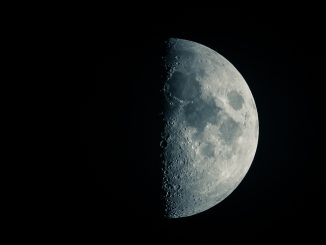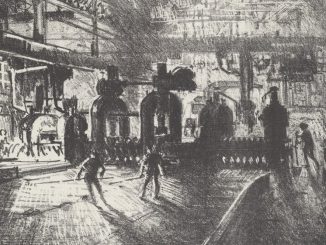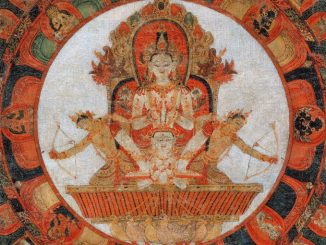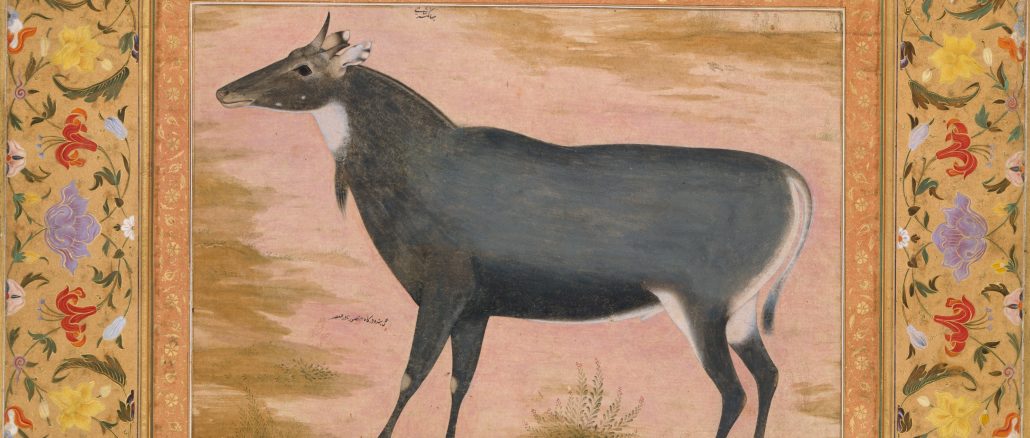
Two months after losing our infant son, we were just starting to learn the language of signs. In Barcelona, a city whose ghosts seem to rise from the walls, our loss found a welcoming home.
The first thing we fell in love with were the towering metal bulls, standing stark and proud atop the highway-hugging hills in silhouetted coups against the sky. We counted a haphazard herd of them on the six-hour drive from Madrid to Barcelona, our curiosity grown at their every appearance along an arid and sparingly built terrain. The uniformity of size and posture hinted at a cause: some state-sponsored installation launched to elicit national pride, a cattle industry ad campaign whose sharp symbolism nonetheless worked to charm. But to us they struck a sweeter chord, our baby boy’s beauty and power rendered with an urgency that made us mute the radio and wonder at their manna aloud.
We were still learning the language of signs, how to distinguish his imagined presence from simply having gone too many minutes without thinking of him. These odd intermittent toros bade us instantly into that space, as clear a guidepost as any we’d had that our innermost dominion, hitherto torn between reason and deluded grief, might be at least loosely rooted in the former. Sixty-one suns had set since Everett’s death, to cancer at 10 months old, and those evocative dusks and inescapable owls had sustained us in ways that no scripture could. The past two months had unfurled at once like a waking coma and a single flitter of an eyelid. We wanted to believe he loved our being here, in Spain, feeling human again following months of cold inertia, though we couldn’t avoid second-guessing it all, to question if we weren’t sensuously embracing life to briefly skirt the permanence of loss. That it was naïve to think we might bury our grief, however temporarily, and not choke on that brutal bouquet wafting from the scarcely covered mound. But then there they were, proud bulls astride the world, just as we three Taureans had been in the months before the terror and tears and systematic defeat, and it was all the weight we needed to hold our feet firmly to the gas.
As rural hills gave way to Barcelona’s lively periphery it felt as though the landscape was funneling us down, our highway a humble brook willing its way to the sea. On the Avinguda Diagonal we lowered our windows to the city din and sea-scented air, breeze shimmering the elms along the boulevard while cyclers sped past and pedestrians outpaced the inching traffic. We dropped the car off at the Sants train station, opting for a cab over a full-luggage subway slog. Our driver couldn’t quite place our street, which I’m sure I butchered badly, prompting him to ask in comparably broken English what neighborhood it was in.
“Ex-amplay?” I asked more than stated, just vaguely recalling the name.
“No sé,” he said, face awash with irked confusion reserved for comically unprepared Americans, my weeks-long refresher having clearly been for naught. Then I remembered the “I.”
“E, I, X,” I began, pronouncing each in tolerable non-Catalan Spanish.
“Yes, yes! Eixample!” he exclaimed, affording X the appropriate shh, and off he drove.
Though awkward, our discursive chasm made it easier to take in the passing cityscape. With every block the full-bloomed trees seemed to soften the gray facades. We were let out at the south end of Carrer Rogent, the pedestrian-only street where we’d booked our apartment. Philip, the owner, hadn’t yet showed, so we doubled back to a quaint bodega we’d passed on the way and bought two bottles of Spanish red for less than 10 euro. Philip arrived minutes later, a handsome man around our age who introduced himself with profuse apologies for being ten minutes late, insisting on the redress of carrying Deana’s bag as he led us upstairs and into our second story abode. There he gave us an abridged tour and requisite rundown of the rules—no more than four guests, no excessive noise past midnight—before bidding us a friendly goodbye.
The apartment was larger than it looked in the listing, a rarity for Airbnbs, with a roomy kitchen adorned in custom tilework and a light-inviting master that led to narrow balcony overlooking Rogent. We agreed to leave the larger room for Greg and Kate, close friends who were slated to join us two days from then, on what would’ve been Everett’s first birthday. Deana immediately built him a makeshift shrine in the entryway between the kitchen and outside patio, assuring our daily candles and chants continued through the ephemeral merriment. That afternoon we drank and rollicked on the master bed and dozed to the shrieks of freed schoolchildren ringing past the creaking shutters of the balcony.
Our first proper meal was at an unassuming neighborhood joint just blocks away. Deana slyly mentioned my birthday to our English-speaking waiter, who brought us a complimentary pitcher of his patented sangria. Most of the city hadn’t yet digested lunch, much less planned for dinner, so we savored our patatas bravas and croquettes and calamari as the patio’s only patrons, moments between words silent save for the low drone of distant bustle. But mostly we talked, about first impressions of the people and vibe; about tapas and why our country reflexively loathed the idea; and about Rett and the pressing imperative that we make room amid the libertine romps for the spiritual—whether weighty and planned or random words upon a wall—to love and honor him by.
Neither of us had been raised in religious homes, our lineages having run the yawning gamut between practicing Catholic and recovering therefrom. In her twenties Deana came to find a reliable crux in the teachings of Ashtanga yoga, of the intrinsic unity of mind and body and being in all forms besides. She’d been a near-daily practitioner long before we’d met, and that rootedness drew me in like a nebula. I enjoyed no such epiphany, adopting instead a brand of buoyant agnosticism: the thought that a higher order, however unknowable in full, might nevertheless be at work, and that free human wills, however futile in part, are the sand grains we lay to build our Babel at last. That in the similarity of order between stars and cells there’s a ladder we might scale to at least approach that big-T Truth, albeit expanding so fast as to freeze us in our reach. Not that either framework could account for the death of a child, let alone one of such a cellular scourge. But nor were we tortured by scouring chapter and verse for a line we could bend to a frame, or driven to feeling we were being punished, beyond the brief but fleeting karmic doubt. We merely told a story any desperate skeptic might: that the misaligned spheres and cardinal squares so many had seen in Rett’s charts pointed to a soul who had but one brief earthly mission to live.
That night we took turns sitting with him in the entryway, a pair of candles articulating his black and white wallet-sized print and attendant runes of remembrance: his gray stuffed gorilla, the wind-up ambulance whose wheels he’d tinker with for minutes on end. The confluence of place and distance and sheer lack of sleep felt overwhelming, like the placeless mood of the night’s first dream. That photo of him, from our first trip home post-diagnosis, always exuded an eerie energy, comforting one night and gutting the next, an indispensable gnostic verse tri-folded and tattered in a pioneer’s pocket. I wept as quietly as I could, not wanting to redraw Deana to the fray, which only made the whispered heaves of “I miss you” burn all the more. With tears re-dammed I started to speak, pausing with each remark that he might respond through movement in the flame, though I knew my breath was swaying it so, with questions where only yeses would do.
* * * *
Montserrat stole our hearts more slowly, endearment swelling with every step and gaze around its sprawling crag-embedded grounds. It cut an otherworldly stance even from afar, the mile-ish tram from the mountain base bringing the monastery into ever grander focus. An April Monday crowd made for near-solitary walks through the series of trails encircling the Abbey of Santa Maria, along which stood a series of modest shrines erected in honor of the Virgin Mother, one every fifty or so yards. Beneath each lay tiny trinkets or tokens of remembrance, candles melted to nubs and wax cascading off the makeshift altars. We timed our hike to coincide with 12:22, the trio of twos marking the day of his death, at which point we’d visit the closest shrine and salute his first birthday. There were those who insisted the first would be the hardest, a warning we’d internalized enough to plan the trip’s longest detour thus—a journey to keep our minds on a fixed and distant end. And yet no amount of movement or soul-relaxing scenery could drain the venom coursing forth: an anger that he never knew the sound of people singing only for him, over a candle blown only in joy.
When the minute struck we were mere steps from the designated monument, which at first looked like many we’d seen, around five by eight inches and set within a modest mound of earth. We’d already begun our solemn soliloquy when Deana used a pause to note Mary’s exposed breast, a wide-eyed Christ child demurely latched thereto. That our plan would bring us here, to the one remotely naked Virgin either of us had ever seen, immediately made the day more than worth it. Through it all and to the end, Everett treated his feedings like church, alternately studious and distracted by a waggish design. If this was the one-liner he’d been working on all the while—a bare-chested Mary cradling a ravenous god—what a timely one it was. We’d long believed, from random newborn mannerism to spells of hospital mania, that Everett harbored a jocular sense of humor. Now, we’re merely thankful to have that line foremost within our switchboard of signs, always eye-level and never long for glowing.
Back at the abbey we joined the line that would take us inside for an audience with the Black Madonna, the centuries-old statue so named for its dark, gilt-adorned wood. Neither of us was raised in a religious home, forget The Church, and still we succumbed to the pull of a Rick Steves pilgrimage, content to queue with hundreds of others for whom that coming moment had been countless masses in the making. A boy’s choir, The Escolania de Montserrat, was chanting as we entered the nave. Their white robes burst against the dimly lit woodwork and gray milieu of the frescoes above, accentuating a sound that likewise rose in warm defiance of whatever darkness we might’ve harbored. A pair of stairs brought us to just beyond the statue’s dedicated alcove. We watched as now-familiar faces met the Madonna for their solemn encounter, some head down and grave, others smiling and reverential as they touched the golden orb held flush to glass by Mary’s right hand. When our turn came we erred with quiet reverence, focusing gaze and thought on the crowned and curly-haired boy in her lap as our hands shared the sphere and the unexpected gravity thereof. It was a weight worth the wait, one that even we unbelievers could feel, by way of an angel that felt increasingly real.
Before leaving we visited one of the numerous open-air hollows filled with tier upon tier of candles lining the path, finding among the hundreds a lonely looking taper unlit amid a legion of flames. We knew, and know still now, that if Rett arrived anywhere he did so to a lovely welcome, wherever the plane and whoever the kin therein, a spark adding to the infinite. This waxed-streaked plastic avatar was our renewed wish at that arrival, the fires about him representing both a hope for warmth in that faraway realm, and the warming souvenir that we’ll never be alone lamenting in ours. It’s still the only birthday candle we’ve ever lit for him, and if we know him at all, it’s the one gift he would’ve asked for.
* * * *
Kate and Greg were posted on the bench outside our apartment when we returned later that evening. We’d planned our trip to coincide with the first leg of their belated honeymoon through Europe, thinking the company might better ease us into what still seemed a strange and perplexing sojourn. They were and remain treasured friends, through years and every hidden horror of Rett’s sickness, consistently there with an ear or a drink or both or four of each. And laughter, always laughter, in the way only those on the same twisted wavelength can laugh. My and Greg’s pact, in particular, dated back more than a decade, to our junior year and bong rips in the bathroom sink, through all the woeful life decisions that mark the male 20s. He’d known Deana nearly as long as I had, having been a mainstay during the early days of our courtship, and their Taurean rapport had never wavered. He met Kate a few years later, and the four of us had shared in all manner of carousal since, going to shows or surviving bunk molly and even worse karaoke on New Year’s Eves that ended in their guestroom. Less than two months before Rett’s diagnosis I’d stood in their wedding, as Greg had in ours, Deana and I being two of the last to bid them goodnight and good luck across the threshold, as they were for us. We had three days together in Barcelona, and we would ravish them accordingly: ebullient and free and with caution cast straight into the squall.
The repartee continued upstairs and into a hurriedly opened bottle of wine, over which we caught up on travel travails and set our loose itinerary, starting with an early trek to the beach and post-lunch outing to Gaudí’s Park Guell the following day. In the interim we’d drink and talk and traipse about the living streets, akin to past joys but at a heartier and readier pace—at once more alive and desperate for life. Deana and I had come to Spain at a time when the ground around our home had just begun to thaw, in the wake of a winter that froze our lives and then our wills and then the labored breath of our son. To be somewhere winter couldn’t touch, alongside those with whom the summer of life had seen its highest suns, made us love the sun and life anew. We needed the kind of friends who could turn our gravity into true gestalt, drawing in light like an endless bloom. Friends who’d seen Everett’s pain but knew some distance from his death, who hadn’t been there in the days after St. Jude and the night he finally freed himself and our makeshift wake with candles in his crib. Our story surely jarred them, but in ways that rewire you to treasure the life you have. We needed to feel that distance, however transitive the source, and so embraced it as a gift.
It was a mile and a half to the stretch of beach Deana and I had walked two days prior, though we opted for a different and more circuitous route with Greg and Kate, past La Sagrada Familia and due south along Carrer de la Marina and then up the shore until fatigue or drunkenness forced us to the subway. Gaudí’s posthumous masterpiece arose like a stone leviathan, skyline cowering below the majestic spires and ornate neo-gothic facades while throngs of sightseers stood and awed as if descended upon by an alien vessel. Assuming Parc Guell’s lines were bound to be the same we concurred on orbiting the cathedral’s perimeter for a cursory survey. We parsed its astonishing scale and the trust required to begin a work knowing the vision’s balance lay in others’ hands, pondering how those later artists squared homage and mimicry and whether Gaudí himself ever even dared to choose. What remarkable belief in one’s fellow man, we agreed, to see a future forever reaching for euphoric ends, a shared legacy at once radiating faith and sealing it inside.
We lunched over seafood tapas and caipirinhas at a beachfront cabana. Greg raised the idea of buying tickets to see FC Barcelona, slated to play Getafe at Camp Nou the following night. Deana and I were doing our best to budget our vice, and with another week in Lisbon still to go balked at dropping a hundred and sixty euro on a sport we were both ambivalent towards. But Greg pressed the issue, determining it a late birthday nod for Everett and me. Granting, he said, that I picked up the lunch tab, ordering another round the instant I concurred. The metro ride to Parc Guell took longer than scheduled, so we passed the minutes writing absurdist backstories for our fellow passengers: the man with a hand that couldn’t leave his pocket because it had to defend his eggroll; the investment banker with a sex fetish involving his basement bee colony. People began to notice our tearful laughter by the time we disembarked the train, still laughing as we ascended the stairs and emerged into the measures hotter air of Carmel Hill. A steep and sweaty quarter-mile trudge brought us to the entrance, where another line awaited. So we chose again to roam the outskirts, through and around the matrix of canopies and caverns and nests whose whimsies belied the artist’s maniacal precision and polymath rigor. Gaudí’s reverence for the interwovenness of nature, for life’s incumbent surreality and wonder, was almost pathogenic, stirring us in ways picayune and profound. That elan helped bring about one of Deana and mine’s most beloved photos: arms cinched to waists on a sun-swept terrace, city stretching to sea below us, smiles shone as genuinely as they had in a year, back when life’s greatest art lay in the eyes and cries of our boy.
Our revelry endured through drinks and dinner in Barri Gotic, where we roamed the slender labyrinths in rapt enchantment as dusk draped its shadows down the golden walls, echoes of voices and shuffled shoes lulling all nerves to rest. Amid such weathered places one can’t help reckoning art with a history that so suppressed and freed it, how violence lies in beauty’s genes and even the purest creations have corruption in their blood. We all inherit the pyramids, monument and method, precisely because we were always already raising them. And so I would think about Rett, endeavoring to see his loss as part of this greater and cruel tableau, rather than the solipsistic curse we’re so wired to know and never tile over in full. And how faced with believing ourselves singled out by the universe, the two solaces worth a damn are knowing that pall defines us all, and finding joy among the ghosts. In its ancient air and centuries of strife Barcelona wears that aura with grace, and being lucky enough to course it, however sheer our time, helped us heal in ways nothing else could’ve. That and wine with friends and sideways frolics through the alleys, fingertips gently brushing the cracks our ancestors fated us to feel.
* * * *
With time dwindling the following day and too many museums to see, Greg and Kate picked Picasso in the Gothic Quarter, while Deana and I chose Gaudí’s Casa Batlló, with the pact we’d meet about five and head to Camp Nou. The line outside the museum was long but swift moving. As far as facades it was the most mesmerizing I’d ever seen, with incongruously curved windows and bluish mosaics conjuring psilocybin memories a decade gone. Our tickets included a pair of headphones and accompanying tablet that animated every room and the objects inside with the dreamlike similes Gaudí himself supposedly noted: stonework floating into sea turtles; rails into flocks of birds; everything shimmering and brilliant and seldom monochrome or still. By about the fourth or fifth room the effect became truly disorienting, to where I could barely tell the difference between the screen and what was in front of me, causing sporadic stumbles into objects and walls and, more than once, unwitting bystanders. Never had being so hung over felt so lovely, or so exhausting. I finally understood Gaudí, and all it took was a mind still halfway mired in escape.
The four of us boarded the metro for our near-hour trek to Camp Nou. At every stop the red and blue Barca regalia multiplied, Messi galvanizing a minor all-ages army of number ten kits ranging from bodega knockoff to half a week’s pay. As the train deboarded we were immersed in their ranks, phalanx moving through the underground terminal and into the tepid late-day air. We bellied up at the first open table we could find, at a burger bar that served towering beers to the football faithful and a perfect window to the masses of fans streaming by. Camp Nou itself cut the profile of many an American stadium, minus the ill-conceived body paint and general Bud Light buffoonery. Despite being two rows from the rearmost rampart and the late recognition that no beer was being sold on the premises, the panoramic command of our midfield seats was more than worth the altitude, allowing us to watch Barca’s brilliance unleashed in pointillist splendor. Messi struck first, on a penalty kick nine minutes in, and from there the route was on, with Suarez, Neymar, and Xavi—the side’s other luminaries—notching additional nets. “The Banana Boys” we christened poor Getafe, donned in all yellow and helpless as dead pines in a generational gale. Watching beauty not just win, but eviscerate and leave its lesser for dead, dug out some of the deepest, most dormant manna yet. And we aimed to spend it, beginning with some absinthe.
Bar Marsella was the infamous haunt elevated to myth by Dalí and Gaudí and Hemingway and various other bohemian luminaries. Odds were even the place had been dusted in the subsequent ninety years—such was its stubborn degenerate ambiance. Yet the whole aesthetic entombment somehow worked, in the sooty shelves full of antique books and bottles and the surly barkeep leering through our every word. Owing to the scarce seating the bar was offputtingly low, or anyway it seemed that way until the absinthe tightened and the inner logic of the space, designed as it was with discourse in mind, made the old ephemera glow. Talking feels different in a place like this, as if there’s a whole separate specter of clientele weighing every word and cutting in edgewise without your hearing it. Only rather than bully you into deferential quiet the choir compels you to sing. Some assume a loss like ours would drive one’s focus within, to the nexus of thoughts and acts that led to trauma’s door. And while such searching invariably came, I coped first—and I think Deana did too, in part—by looking outward, whether for signs or sensations or shapes among the clouds. When the world rips your life away, you either seize in kind what life you find, or let the painful pulsing void envelop all that’s left.
The next day’s plan, after walking off the fog, was to simply wander the city’s byways before staying with Greg and Kate at their newly rented apartment in Barri Gotic. We spent most of the afternoon wandering La Rambla with luggage in tow, ducking into shops and art galleries and lunching over beers on a hookah bar patio. Once their apartment was ready we rolled our suitcases through a sequence of alleys to a building feet from an airy square, struggling up two flights of narrow stairs to a door revealing a unit an eighth the size of our previous pad. Collapsing into whatever spaces our bodies could find the four of us bandied back and forth on whether it might be a crowd, Greg suggesting the upstairs-quartered owner seemed a stickler for the rules, Deana and I offering to get a hostel, and Kate insisting all would be fine if we stayed, catch a flamenco show in the square, and play the remainder by feel.
One last stroll down La Rambla took place at twilight, glow-in the-dark slingshot toys and their hawkers heralding our path like a cheap but beautiful parade. Back into Barri Gotic for tapas on a shadow-cast patio, to reflect on our time and wonder ahead—Lisboa and home for us, the whole of Europe for them—to a life none of us knew how would unfold. In flamenco we received our last lascivious rites, the gorgeous arabesque airs casting a pheromonal trance onto the forty or so gathered in the intimate red-lit theater. The one-woman trio provoked Deana and me to sporadic knowing glints and caresses below the drink table feet from the stage and sweat-mining lights. When the show let out we ambled through the now crowded full of banter but lurching slowly to empty. As we passed a serviceable-seeming hostel Deana halted the group to implore, warmly but not a little weary, that we stay there instead. We needed to leave on the early side, she said, so as not to battle traffic north to Cadaques. Kate and Greg did their cordial best to convince us otherwise, maintaining they’d make whatever room necessary, but I could tell Deana wouldn’t be dissuaded. We gathered our bags from the apartment and doubled back to the hostel, where we bid them goodbye with long hugs and wishes well, promising to get together as soon as they returned in June.
We were given a shared room with the assurance additional guests were unlikely. It was spacious enough, a pair of king beds set atop small flights of stairs. We slipped beneath the sheets and flicked the lights and faced one another on our sides. We began to kiss, mouths entwined in a doyen dance until I felt the whole of her will pull away and saw the sorrow claim its time. She cried in the way you feel the heat in someone’s tears, saying how much she missed him and felt awful for having gone more than a day without a candlelit séance. I reassured her we’d talk to him tomorrow as soon as we arrived, caressing her hair through the pillow-softening sobs. “I don’t want to miss a day,” she said, “not one,” and all I could do was to agree and know nevertheless, as Deana certainly did, that we invariably would.
We left the city during a May Day demonstration replete with chants and marches for Catalan sovereignty. Our car kept at a crawl outside the city, causing our already revelry-frail nerves to singe even more. Deana had long found my impatience for traffic insufferable, and as the GPS began ticking our two-hour drive upward, sending me into the usual fruitless tirade, her peevishness surfaced like an overslept geyser. Hurtful things were said. Awful things we immediately regretted but were far too proud to own, after which we sat in silence near an hour before the congestion loosened and the highway opened up for the remaining stretch, saying our due apologies and filling the time as we normally would. That we were leaving Barcelona, a place that in a mere five days had relit an irretrievable snast, certainly worsened the row. But we knew the true culprit’s face, were coming to know its leprous scars by rote. For all the bulls and twos that flare our journey ahead, grief is the glaring billboard every tenth of a mile, incessant cues to the miniscule distance we’ve come, along a road of dust designed to summon us in kind.
Check out our exclusive The Nasiona interview with the author, “When Your Rise: Interview With Jim Cavan.” Read Jim Cavan’s other memoir chapter, “When We Knew Our Son Was Slipping Away,” published in Catapult, by clicking on the image below.
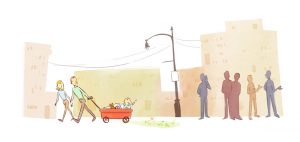

JIM CAVAN is a recovering sportswriter whose work has appeared at Catapult, ESPN.com, SI.com, The Cauldron, Grantland, SB Nation, Narratively, Eeephus, and the New York Times, among others. He’s currently working on a book, tentatively titled When You Rise: A Memoir of Love and Loss.
In 2015, Jim’s infant son, Everett, passed away after a four-month fight with a rare form of pediatric cancer. Shortly after Everett’s passing, Jim and his wife, Deana, launched Rett’s Roost, a nonprofit organization that runs retreats for families affected by childhood cancer.
He lives in Maine with Deana and their two-year-old daughter, Everly.
Twitter: @JPCavan
Featured image: Mansur, “Study of a Nilgai (Blue Bull),” Folio from the Shah Jahan Album, album leaf, ca. 1550, Purchase, Rogers Fund and The Kevorkian Foundation Gift, 1955, The Metropolitan Museum of Art.
